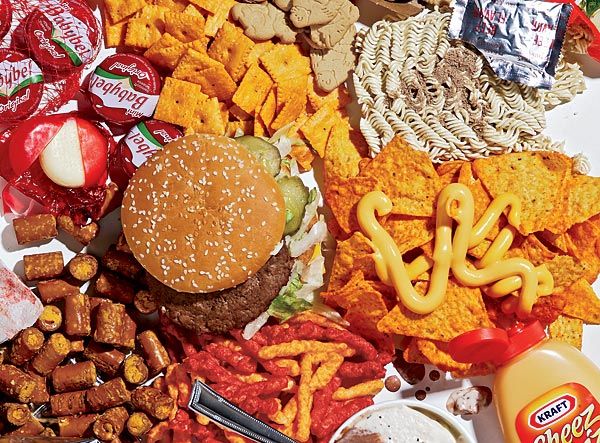America's High Fat Diet Alters Crucial Aspects of Brain's Dopamine Signaling
/
Evidence continues to mount that the effects of high-fat diets on brain function and cognitive development are substantial and potentially irreversible. We must ask about the impact of high-fat diets and children’s obesity on classroom performance and test scores.
Conservatives scream ‘nannygate’, that we’re meddling in parenting to suggest that childhood obesity is a massive problem, a future national security risk. This overview of recent research findings on brain function and high-fat diets is chilling.
High-Fat Addiction
Rats that consumed a high-fat diet for an extended period of time showed irreversible brain function changes in areas associated with reward and pleasure. Fatty foods tap the pleasure centers of the brain, the same areas triggered by heroin and cocaine. The regions of the brain which are involved in self-control and the regulation of appetite are mostly affected by obesity.
In this way the high-fat diet becomes addictive. Just as a drug addict can’t kick a drug habit, after a certain point, people who want to lose weight can’t fix their cravings.
The findings are similar to the findings of Dr Paul Johnson, a neuroscientist at the Scripps Institute in Jupiter, Fla.
Dr Johnson observed that the more fast food rats consume, the stronger is the drive to eat more and more to feel cheerful. The study combined different diets of food with observed behavior and brain scans of rats’ pleasure centers.
In mice, at least, junk food gradually becomes an alternative for happiness.

High-Fat Diets Depress Dopamine in Rats
Earlier research presented at the 2010 Annual Meeting of the Society for the Study of Ingestive Behavior also found that prolonged exposure to a high fat diet is correlated with changes in the brain chemical dopamine within the striatum, a critical component of the brain’s reward system.
Compared to the rats consuming a standard low fat diet, high-fat diet rats exhibited reduced — not increased — dopamine release and also reduced reuptake by “dopamine transporters” within the striatum. Read on at Science Daily
Dopamine and Positive Emotionality
Cornell University researcher Richard Depue concluded in the mid-1990s that dopamine is strongly related to the trait some researchers call extraversion, but Depue and his colleagues prefer to refer to it as “positive emotionality.”
The higher the level of dopamine, or the more responsive the brain is to dopamine, the more likely a person is to be sensitive to incentives and rewards. “When our dopamine system is activated, we are more positive, excited and eager to go after goals or rewards, such as food, sex, money, education or professional achievements,” Depue said.
In related research, Depue has shown that dopamine is strongly related to how well the prefrontal cortex holds information. Now we are talking not only about motivitation to go after rewards and to excel to get what we want, but our cognitive ability to learn.
“To hold in short-term memory a spatial map of the environment, for example, you must have the dopamine system activated; without it, you can’t do this type of cognitive functioning,” Depue concludes from his research in this area.
Is America’s high-fat diet depressing the desires of our kids to achieve — because they are ‘hooked’ on a high-fat diet? I’m no doctor or food nutritionist, but I’ve read these research studies for three years and am so concerned with their claims.
Dopamine and Good Choices
 Researchers at the University of Colorado Boulder studying Parkinson’s disease patients also reported strong evidence that dopamine plays a critical key role in how people implicitly learn to make choices that lead to good outcomes, while simultaneously avoiding bad ones.
Researchers at the University of Colorado Boulder studying Parkinson’s disease patients also reported strong evidence that dopamine plays a critical key role in how people implicitly learn to make choices that lead to good outcomes, while simultaneously avoiding bad ones.
Dopamine-reduced brain impairment is only one piece of the neurological puzzle, when the topic is a high-fat diet.
It’s difficult to separate the intersections of a malfunctioning dopamine signaling system and other brain functions, that are impacted by a high fat diet.
Obesity and Severe Brain Degeneration
In September 2009, we reported that a brain-imaging study by researchers at UCLA and the University of Pittsburg found that the brains of overweight and obese subjects were on average 4% and 8% smaller, respectively, than the brains of those who were at a healthy weight.
According to UCLA neurology professor and study author Paul Thompson, the impact of obesity caused “severe brain degeneration.”
If one is obese, the news is particularly bad. Not only does one’s brain shrink, but the damage occurs in the frontal temporal lobes, the seat of higher-order reasoning and judgement; the anterior cingulate gyrus, key to attention and decision-making as well; the hippocampus, where long-term memories are processed, and the basal ganglia, from which smooth movement is initiated.
 Scientists at Oxford University found that a high-fat diet damaged the short-term memory of rats in less than 10 days. After just four days, the muscles of high-fat, junk-food-fed rats were less able to use oxygen required for exercise. This condition also caused hearts to enlarge.
Scientists at Oxford University found that a high-fat diet damaged the short-term memory of rats in less than 10 days. After just four days, the muscles of high-fat, junk-food-fed rats were less able to use oxygen required for exercise. This condition also caused hearts to enlarge.
More Brain Function Food Misfires
In September 2010, Australian professor Michael Cowley says that there were two clear outcomes from his latest research on brain function and obesity:
1. A high-fat diet caused brain cells to become insulated from the body, leaving the brain not open to receive satiety signals or a message that says ‘I’m full.’
2. Secondly, the insulated brain was unable to detect signals to increase energy and burn off calories.
We will continue to dig deeply on this topic, piecing together a research puzzle that doesn’t command the national attention that it should. America is a nation that assumes there’s a pill for everything. I don’t know how we will put our children’s minds back together again. That pill does not exist today. Anne





























